Recently in Turkey there have been reports that in 2019, Turkish President Recep Tayyip Erdoğan's government released from prison at least 32 men who had been sentenced to life in prison for their involvement in over 100 murders and membership in a group that in Turkish is referred to simply as "Hizbullah," but to avoid confusion with the Lebanese group by the same name, is in English alternatively called Kurdish Hizbullah, Turkish Hizbullah, and Hizbullah in Turkey. The oft-repeated conventional wisdom is that this Turkish organization has no relationship to the better-known Iran-backed Lebanese organization by the same name. Several facts indicate that this is not the case, and that Hizbullah in Turkey has received funding, logistical support, and training from the Iranian government.
This analysis will review: the Turkish government's release of Hizbullah members convicted of murder; the Turkish opposition's response to news of the release; evidence of Iranian funding, logistical support, and training for Hizbullah in Turkey; and some of the activity of Hizbullah in Turkey today.
2019 Release Of Mehmet Salih Kölge, Deputy To Hizbullah Leader Hüseyin Velioğlu, 31 Other Men Responsible For 157 Operations Resulting In 91 Deaths
On April 25, 2022, Turkish journalist Özgür Cebe reported that right before the March 31, 2019 local elections, the Turkish government released from prison one Mehmet Salih Kölge, who had been the deputy of Hüseyin Velioğlu, the leader of Hizbullah in Turkey who was killed in a shootout with police in Istanbul on January 17, 2000.
Kölge had been given an "aggravated"[1] life sentence in prison for ordering the killing of 91 people between 1992 and 2001 and for attending interrogations that involved torture and "hogtying." The court was unanimous in confirming the ruling at the time, and said that he was responsible for giving orders and instructions for 157 armed incidents in which 91 people were killed and 66 others were injured in the Turkish cities of Gaziantep, Şırnak, Mardin, and Batman.[2]
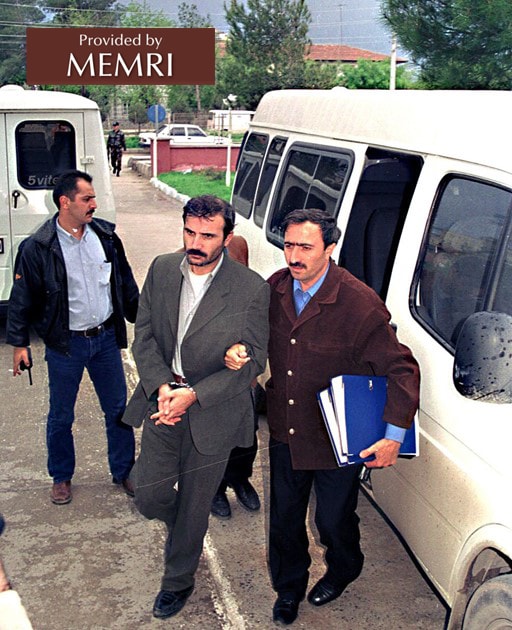
Mehmet Salih Kölge (source: Cumhuriyet.com.tr)
Kölge reportedly discovered the Hizbullah organization while working in a bookshop in the city of Nusaybin in Turkey's Mardin province. In a short time, he rose in the organization to reach its shura (i.e., high council), and worked in the information-processing center in safe houses connected to Velioğlu "to upload encrypted documents to computers." Kölge was at the shura at which it was decided that Diyarbakir Security Director Gaffar Okkan, who was known for his robust stance on policing Diyarbakır and whom the organization held responsible for the death of its leader Hüseyin Velioğlu, would be assassinated. On January 24, 2001, in Diyarbakır, as many as 10 attackers using long-barreled rifles and intersecting fields of fire participated in the assassination of Okkan, which resulted in the deaths of Okkan as well as four bodyguards, Sabri Gün, Mehmet Sepetçi, Atilla Durmuş, and Selahattin Baysoy, and one administrator, Mehmet Kamalı.[3] Thousands of people attended Okkan's funeral, and the BBC and CNN reported on the assassination at the time.[4]
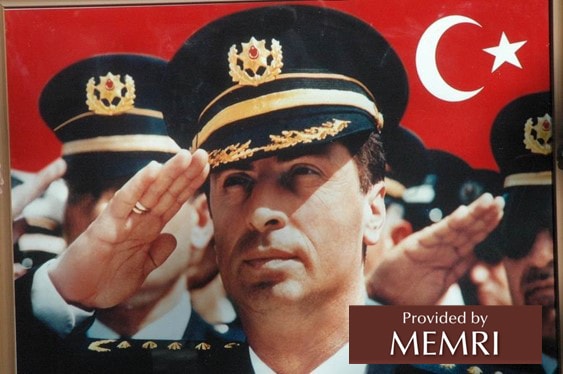
As many as ten assassins using long-barreled rifles and intersecting fields of fire assassinated Gaffar Okkan in Diyarbakır on January 24, 2001.
The court's judgment recorded that after one Salih Karaaslan, a former member of Hizbullah, had decided to marry Özgür Elmas, a former konsomatris[5] at a bar in Gaziantep province, Kölge told Karaaslan: "The congregation [i.e., Hizbullah] will not permit this disgrace. You are a Muslim. Abandon this woman or you will both die." Despite this threat, Karaaslan and Elmas got married. Kölge later hogtied, interrogated, and tortured the couple in the basement of a home in Gaziantep before strangling them to death. The ruling further recorded that Kölge, concerned that Karaaslan's older brother Mehmet Ali and cousin Hamza, both of whom knew about this incident, may go to the police, called the two men to the basement of the same home, where he had them strangled to death. He buried the corpses of Salih, Mehmet Ali, and Hamza in the basement and poured concrete over the spot where they were buried. Giving the justification that her corpse was namahrem,[6] Kölge buried the corpse on the side of a road in Kahramanmaraş. The court noted that Kölge had shown the locations of the corpses.
Kölge later filed an appeal, and the court found that according to the European Convention on Human Rights and the European Court of Human Rights, because the case had not been concluded in a reasonable time and a military judge had been on the committee in the process of the trial, Kölge's right to a fair trial had been violated, and Kölge was discharged in the context of a new trial. While the dates of Kölge's conviction and appeal are unclear, Murat Bakan, member of parliament representing İzmir for the opposition CHP, recently said in parliament that in 2018, the Constitutional Court in Turkey had ruled that a military judge being found on a judicial committee was cause for retrial. For this reason, and the timing of his release in 2019, it is possible that Kölge's appeal happened sometime in 2018.
On May 6, 2022, Turkish news outlet Tele1.com reported that from January to April of 2019, around the same time that Kölge was released, the government had released another 31 Hizbullah members,[7] 19 of whom were connected to the same 91 killings and all of whom had been given aggravated life sentences.[8] The Diyarbakır criminal court had charged these 19 men separately in 2007 with "establishing an Islamic state on the Iranian model by means of qualitatively grave actions directed at overturning the constitutional order." In 2010, the high court approved the aggravated life sentences, calling attention to how the evidence was handled in accordance with the law and how in the examination of the file as a whole, it had found no irregularities in the conviction rulings. It further found that those sentenced had applied a strategy of "teblig (propaganda), congregation (forming a structured organization), and jihad (armed terror)" to constitute the armed wing of the organization, and, having attacked with meat cleavers and firearms those whom they viewed as being against Hizbullah, were personally responsible for their 91 deaths. The men said that they had been forced to commit these murders because they could not stand the torture that they had undergone during long detainments.[9]
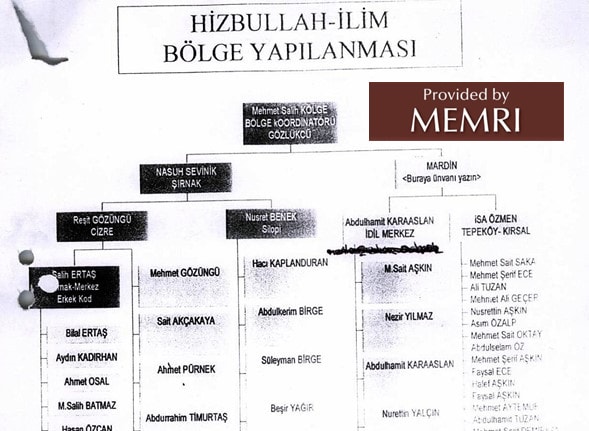
A photo of a document showing a portion of the organizational structure of the branch of Hizbullah under Kölge's direction.
On May 13, 2022, T24.com reported that the government had released from prison three more Hizbullah members responsible for 48 operations in which they had killed 28 people, wounded 14, kidnapped one, and torched four vehicles. The court detailed the evidence of the murders that the three men, Bilal Soytaş, Sadun Çiğdem and Fırat Nart, had committed in a 780-page document, convicted them on the charge of "tearing down the constitutional order by force of arms," and given them aggravated life sentences.[10]
Opposition Response In Parliament: "Have There Been Convicted Members Of Organizations Aside From Hizbullah Released Using The Same Justification?"
On May 8, 2022, the Turkish daily Sözcü reported that Murat Bakan, member of parliament representing İzmir for the opposition CHP, had brought the matter of the release of these men to parliament, but had received no answer, either from Turkey's Ministry of Justice or the Presidential Communication Center.[11] Bakan said: "A refreshing of the memory and a warning are in order. In 2018, the Constitutional Court made the decision that 'a military judge being found on the committee is cause for retrial.' And the courts began to release members of Hizbullah who had been convicted of heavy crimes... Now it is seen that it is convicted Hizbullah hitmen's turn for release... It is not possible to understand this 'brave' position, this austerity concerning Hizbullah, which savagely slaughtered hundreds of people. All of these questions and answers concern public opinion. We asked [then Justice Minister] Abdülhamit Gül: 'What is the number of Hizbullah convicts convicted of crimes such as murder, torture, and managing a [criminal] organization that have been released? How many convicted members of other organizations whose committees included military judges have applied for a retrial following the Constitutional Court's decision? Have there been convicted members of organizations aside from Hizbullah released using the same justification? If so, how many?
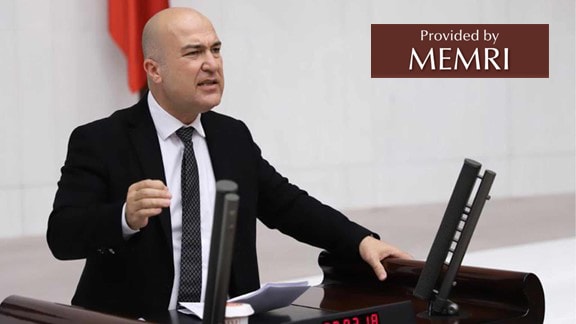
Murat Bakan of the CHP brought the matter to parliament.
"Just as we received no answers to these questions, an answer was not given to our application [concerning this matter] to the Presidential Communication Center, with Article 25 of the information acquisition law, titled 'Internal Institutional Regulations,' given as justification. So: is the fate and number of members of Hizbullah convicted of crimes such as murder, torture, and managing a [criminal] organization who have been released not a matter of public opinion? Are these Hizbullah members in the country or have they left the country?... We want answers to these questions."
Evidence Of Iranian Funding, Logistical Support, And Training For Hizbullah In Turkey
There is evidence of Iranian funding, logistical support, and training for Hizbullah in Turkey. Twenty-two years ago, on January 22, 2000, writing in the Milliyet daily, journalist Tunca Bengin[12] wrote an article titled: "The Devil's Triangle In Terrorism." The article was published 11 months after the February 15, 1999 capture of Abdullah Öcalan, leader of the PKK, which the U.S., Turkey, and many other countries have designated as a terrorist organization, and four days after the police raid in Istanbul that resulted in shootout and the death of Hizbullah leader Hüseyin Velioğlu.
Tunca wrote: "The second foot of the Hizbullah-PKK-Iran triangle has been broken. Though our neighbor (!) may deny it, the words of the terrorists are clear: 'We were trained in Iran, we received funds.' The PKK camps, the villas at which the militants of the Islamic Movement and Hizbullah stay are clear, one by one. The bloody and murderous story of the PKK and Hizbullah, except their early periods. In 1994, Iran was a broker, they agreed. Against whom? Against the Republic of Turkey that Atatürk founded. Abdullah [Öcalan], about whom debates of whether he should be hanged are ongoing, says all of these things explicitly. Öcalan said in his statement at İmralı [the prison island in the Sea of Marmara where Öcalan is still held today, and where between 1999 and 2009, he was the sole inmate]: 'We made an agreement with Sait, a member of the Iranian intelligence service, to get the weapons, Sam-7 [surface-to-air missile system], and other logistical support safely into the organization's [i.e., the PKKs] hands via Russia. Also we reached an agreement for the establishment of a hospital belonging to the organization in Urmia[, Iran,] and the treatment of the wounded there. In exchange, the PKK would not interfere in the areas of activity of the Hizbullah organization in Turkey and would end its armed fighting [with Hizbullah]. This agreement is still in effect and Iran provides our organization with shelter, weapons, treatment, and the ability to set up camps in that country.'
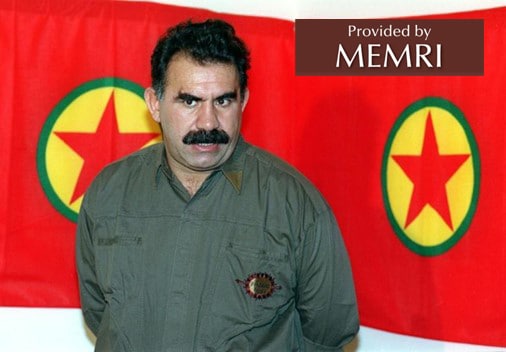
Former PKK leader Abdüllah Öcalan
SUPPORT OUR WORK

"The PKK's discussions with Hizbullah do not end here. Öcalan, who explains that Iran thinks of Hizbullah in place of the PKK, sings like a nightingale: 'The Kurdistan Democratic Party [in Iraq] had very good relations with Iran. They had top-level discussions. They criticized PKK fighting with Hizbullah. The attempts of Iran to develop Hizbullah as an alternative to the PKK were behind the tension we experienced in Turkey until 1994. They really wanted to put them in our place.' But I thought there was no relationship between the Hizbullah in Turkey and the Hizbullah in Lebanon? That Iran does not know what Hizbullah in Turkey is? The importance of the operation in Istanbul [against Hizbullah leader Hüseyin Velioğlu] is becoming apparent... Continuing from Öcalan's words: 'Iran supports Hizbullah [in Turkey]. In 1994, we spoke with Sait, a member of Ettela'at [Iran's Ministry of Intelligence and Security, or Vezarat-e Ettela'at va Amniat-e Keshvar]. We told them to not send Hizbullah at us. I asked them to direct them not against us, but against the Republic of Turkey. I sent this message to Iran with Sait. My warning was effective. Along with our warnings were the effect of our activites. There were big battles between us and Hizbullah. While we were fighting with Hizbullah in Turkey, I established contact with Hizbullah in Lebanon and said: 'As an organization friendly [to them], tell them not to come at us.' I think this also was effective.'"
Beyond Öcalan's statements, on March 3, 2000, Hurriyet daily reported under the headline: "He Turned Out To Be An Iranian Agent" that it had obtained a Farsi-language document that it said was Hüseyin Velioğlu's ID that Iranian intelligence gave to agents working abroad. While MEMRI could not verify the issuing authority, the document reads in Farsi: "Headquarters of Foreign Affairs. Ceremonies of 10 Fajr. Name: Hüseyin Velioğlu. Document number: 20501." It appears to be an ID issued to Velioğlu to be used at ceremonies in Iran commemorating the Iranian Revolution.

A document that the Iranian government issued for Turkish Hizbullah leader Hüseyin Velioğlu.
In 2000, it was reported that then Turkish State Security Court Attorney General Nuh Mete Yüksel wrote in his Hizbullah testimony, which was later published as a book: "Hizbullah is an organization whose source is Iran."[13] In 2000, Edip Gümüş, a senior Hizbullah leader, said that he had gone to Iran three times and had once bumped into Velioğlu in Tehran.[14] In 2001, Abdülaziz Tunç, another senior Hizbullah leader, said in an interview: "In 1988, we went with Hüseyin Velioğlu and other members of the organization to Iran. We secretly had very close relations [with Iran]. We went there and stayed for close to two years, then came back. There were relations in the real sense."[15]
The Turkish edition of German state-funded media outlet Deutsche Welle reported in 2019 that when the releases of 34 Hizbullah members began in 2011, Edip Gümüş had fled to Qom, Iran, where he took over leadership of the organization.[16] Other Hizbullah leaders Cemal Tutar and Hacı İnan were released as well. Other members of Hizbullah in Turkey who had been released and fled to Qom around the time of Gümüş's release in 2011 included: Cemal Tutar, Fuat Balca, Abdülkerim Kaya, Mehmet Varol, Mustafa İpek, Mahmut Demir, and Kemal Gülşen.[17] On January 15, 2011, Milliyet daily reported that Hizbullah members had fled to Iran via the smuggling routes in the Özalp, Saray, and Başkale districts of Turkey's Van province, on the Turkey-Iran border.[18]
Hizbullah In Turkey Today, And Hüda-Par, An Offshoot That Promotes Iranian Interests In Turkey
Edip Gümüş, who had been sentenced to life in prison for "trying to tear down the constitutional order of the State of the Republic of Turkey by force of arms and in its place establish an Islamic state on the basis of shari'a," remains the leader of Hizbullah in Turkey today. His whereabouts are unknown.[19] On January 17, 2020, he gave a statement commemorating the 21st anniversary of the death of Hüseyin Velioğlu in which he said that Hizbullah had been established in 1979 and that "We are calling out to Muslims on the matter of doing whatever is necessary to save Jerusalem. We declare that we, with our 40 years of experience, accumulation, possibilities, and personnel, are prepared to pay any price for the salvation of Jerusalem. There is no step that we will hold back from taking in this matter, we also consider it a duty to support the people, congregations, organizations, establishments, and states that are working for the sake of this."[20] He gave a statement the following year on the 21st anniversary of Velioğlu's death, and on the same day in 2017.[21]

Current Hizbullah leader Edip Gümüş, right, with a photo of former leader Hüseyin Velioğlu.
Following a Turkish government crackdown on Hizbullah in the late 1990s and early 2000s, the remnants of the group at that time formed the Movement Of Solidarity With The Oppressed in 2003. This organization was shut down in 2012, and in its place the Hür Dava Partisi ("Free Cause Party"), better known by its abbreviation as the Hüda-Par ("Hüda" is the Kurdish word for God, taken from Farsi), was founded.[22] Today the Hüda-Par is a small party[23] that generally echoes Iranian policy on various issues. Eight months ago, Hüda Par General Director Zekeriya Yapıcıoğlu received the Iranian Ambassador to Turkey Muhammed Farazand at the party's headquarters for a meeting in which they discussed "developments in the Islamic world, particularly Afghanistan."[24]

Several years ago, then party leader İshak Sağlam said: "In Iraq's capital Baghdad, Iraqi and Iranian military officials were slaughtered by the imperialist U.S.... This having been done by any state, or the U.S., does not legitimize it. The attack that was done was an act of terror. We harshly curse this terror attack." Though the statement is only dated "two years ago," it is presumably in response to the strike that killed Islamic Revolutionary Guard Corps (IRGC) commander Qassem Soleimani and Popular Mobilization Forces (PMF) commander Abu Mahdi Al-Muhandis.[25] The party often criticizes harshly the American sanctions on Iran.[26] Current Hüda-Par leader Yapıcıoğlu has called for the opening of the Gürbülak Border Crossing, which has been closed since the beginning of the COVID-19 pandemic, at the Turkey-Iran border in Turkey's İğdir province.[27] Four years ago, amid protests in Iran, deputy Hüda-par leader Mehmet Yavuz gave a long speech defending Iran and saying that "countries should solve their own internal problems with the consent of their people and by means of their own internal dynamics."[28] Yavuz also spoke four years ago saying that a "U.S. attack plan on Iran" was a "very dangerous step" that would cause a "regional war."[29] Around the same time deputy leader Sait Şahin said that then U.S. President Donald Trump was preparing an intervention in Iran, that "the U.S. is making the targeted land available for the Zionist occupation regime," and that "the U.S. and Russia were forming conditions for an agreement like the Sykes-Picoult Agreement."[30]
*A. Smith is Director of the MEMRI Turkish Media Studies Project.
[1] Under Turkish law, the Ağırlaştırılmış müebbet hapis cezası ("Aggravated Life Sentence In Prison") is a step beyond an ordinary sentence to life in prison, and includes additional constraints. The inmate cannot attend social activities in prison and is allowed, only if the prison administration permits it, to spend time with a maximum of two other inmates for one hour per day. The inmate also cannot attend any exercise or development activities without the permission of the prison administration. Outside visitors and a phone call are permitted only once every two weeks instead of once per week, as is permitted to other inmates. Other constraints also apply. Sozcu.com.tr/2018/gundem/agirlastirilmis-muebbet-hapis-cezasi-nedir-2225649, February 16, 2018.
[2] Sozcu.com.tr/2022/gundem/91-cinayet-66-yaralama-o-da-serbest-birakilmis-7095690, April 25, 2022.
[3] Arsiv.ntv.com.tr/news/58964.asp, January 25, 2001
[4] Edition.cnn.com/2001/WORLD/europe/01/25/turkey.police/index.html, January 25, 2001; News.bbc.co.uk/2/hi/europe/1135087.stm, January 24, 2001.
[5] A konsomatris is a woman who works in a particular kind of bar in Turkey that has elements in common with a strip club. Her role, distinct from that of a stripper or a prostitute, is generally to chat with men and get them to order more food and drinks to earn more money for the venue.
[6] In Islam, one who is namahrem in relation to another is sufficiently distant by blood to be lawful to marry. In this case, the purported sensitivity is that the graves of men and women who are not married or related by blood should not be close to one another.
[7] The men released alongside Kölge were: Kaan Aktaş, Abdurrahim Haşimi Güneş, Hayrettin Demir, Abdurrahman Orhan, Şeyhmus Uğur, Sait Özbey, Adnan Aktaş, Mehmet Kadri Can, İbrahim Güler, Mehmet Şerif Bayındır, Selami Sevim, Mehmet Ziya Gümüş, Hayrettin Şayık, Selman Dil, Ömer Saruhan, Mehmet Mansur Demir, Mehmet Beşir Demir, Mahmut Avcı, and Aziz Keskin. Also released were Hizbullah members involved in the assassination of Diyarbakır Security Director Gaffar Okkan and five of his body guards. Those Hizbullah members were: İbrahim Gürceğiz, Mustafa Bozkurt, Bedran Salamboğa, Servet Yoldaş, Şener Dönük, Veysi Şanlı, Mehmet Fidancı, Mehmet Beşir Varol, and Abdulkadir Aktaş. Mehmet Sincar, member of parliament for the Demokrasi Partisi (DEP), was killed in Batman in 1993. His killers, Cihan Yıldız, Mehmet Ali Geçer, and Mithat Soysal, were released as well. Turkish daily Cumhuriyet reported on Yıldız's release in May 2019.
[8] Tele1.com.tr/91-kisinin-infazindan-mahkum-olan-19-hizbullahci-serbest-birakildi-616573, May 6, 2022.
[9] Cumhuriyet.com.tr/haber/milletvekili-sincar-dahil-6-kisinin-katili-hizbullah-mensubu-yildiz-tahliye-edildi-1405948, May 22, 2019.
[10] T24.com.tr/haber/diyarbakir-da-28-kisiyi-oldurup-sukur-namazi-kilan-3-hizbullahci-daha-serbest-birakilmis,1033898, May 13, 2022.
[11] Sozcu.com.tr/2022/gundem/turkiye-sozcuden-ogrendi-ama-devlet-suspus-7122124, May 8, 2022.
[12] Milliyet.com.tr/yazarlar/tunca-bengin/terorde-seytan-ucgeni-5332544, January 22, 2000.
[13] Milliyet.com.tr/the-others/hizbullah-h-l-devlette-5324614, April 9, 2000.
[14] Hurriyet.com.tr/gundem/hizbullah-lideri-dgmde-bulbul-39181237, September 11, 2000.
[15] Arsiv.ntv.com.tr/news/57456.asp, accessed May25, 2022.
[16] Dw.com/tr/27-y%C4%B1ld%C4%B1r-ayd%C4%B1nlat%C4%B1lamayan-s%C4%B1r-devlet-hizbullah-ili%C5%9Fkisi/a-49046862, June 4, 2019.
[17] Avatoday.net/ar/node/4071, May 1, 2019.
[18] Milliyet.com.tr/siyaset/hizbullahcilar-iran-a-mi-kacti-1339488, January 15, 2011.
[19] Cnnturk.com/2011/turkiye/01/04/hizbullahin.muebbet.saniklarina.tahliye/601834.0/index.html, January 4, 2022.
[20] Independentturkish.com/node/120801/haber/t%C3%BCrkiye-hizbullah%E2%80%99%C4%B1-firari-lideri-g%C3%BCm%C3%BC%C5%9F-mesaj-verdi-40-y%C4%B1ll%C4%B1k-tecr%C3%BCbe-ve, January 21, 2020.
[21] Ilkha.com/english/latest/hizbullah-leader-edip-gumus-issues-a-message-about-17th-january-11547, January 17, 2021; Twitter.com/HalkinPortali/status/821047705325731842/photo/1, January 17, 2022.
[22] Bianet.org/biamag/toplum/145800-hizbullah-teblig-cemaat-cihat, April 13, 2013.
[23] Hudapar.org, accessed May 26, 2022.
[24] Hudapar.org/web/1415/iran-buyukelcisi-farazmanddan-genel-baskanimiz-yapiciogluna-ziyaret.jsp, accessed May 26, 2022.
[25] Hudapar.org/web/1135/genel-baskanimiz-saglam-teror-saldirisini-siddetle-telin-ediyoruz.jsp, accessed May 26, 2022.
[26] Hudapar.org/web/853/dis-iliskiler-baskanligimizdan-gundem-degerlendirmesi.jsp, accessed May 26, 2022.
[27] Hudapar.org/web/1440/genel-baskanimiz-yapicioglu-sinir-ticareti-canlandirilmalidir.jsp, accessed May 26, 2022.
[28] Hudapar.org/web/84/iranda-neler-oluyor.jsp, accessed May 26, 2022.
[29] Hudapar.org/web/776/abdnin-irana-saldiri-plani-ve-cine-yonelik-yaptirimlari-cok-tehlikeli-adimlardir.jsp, accessed May 26, 2022.
[30] Hudapar.org/web/440/abd-suriyede-rusya-ile-yeni-bir-sykes-picot-imzalamak-istiyor.jsp, accessed May 26, 2022.




